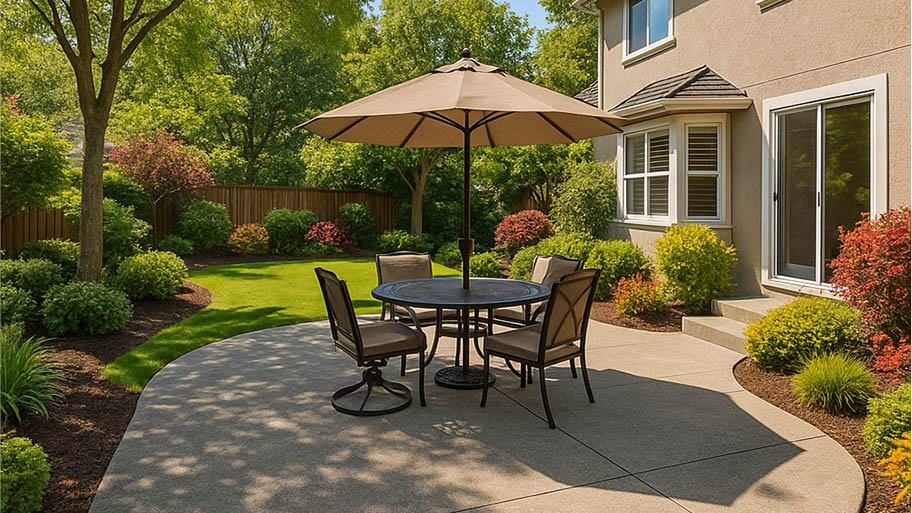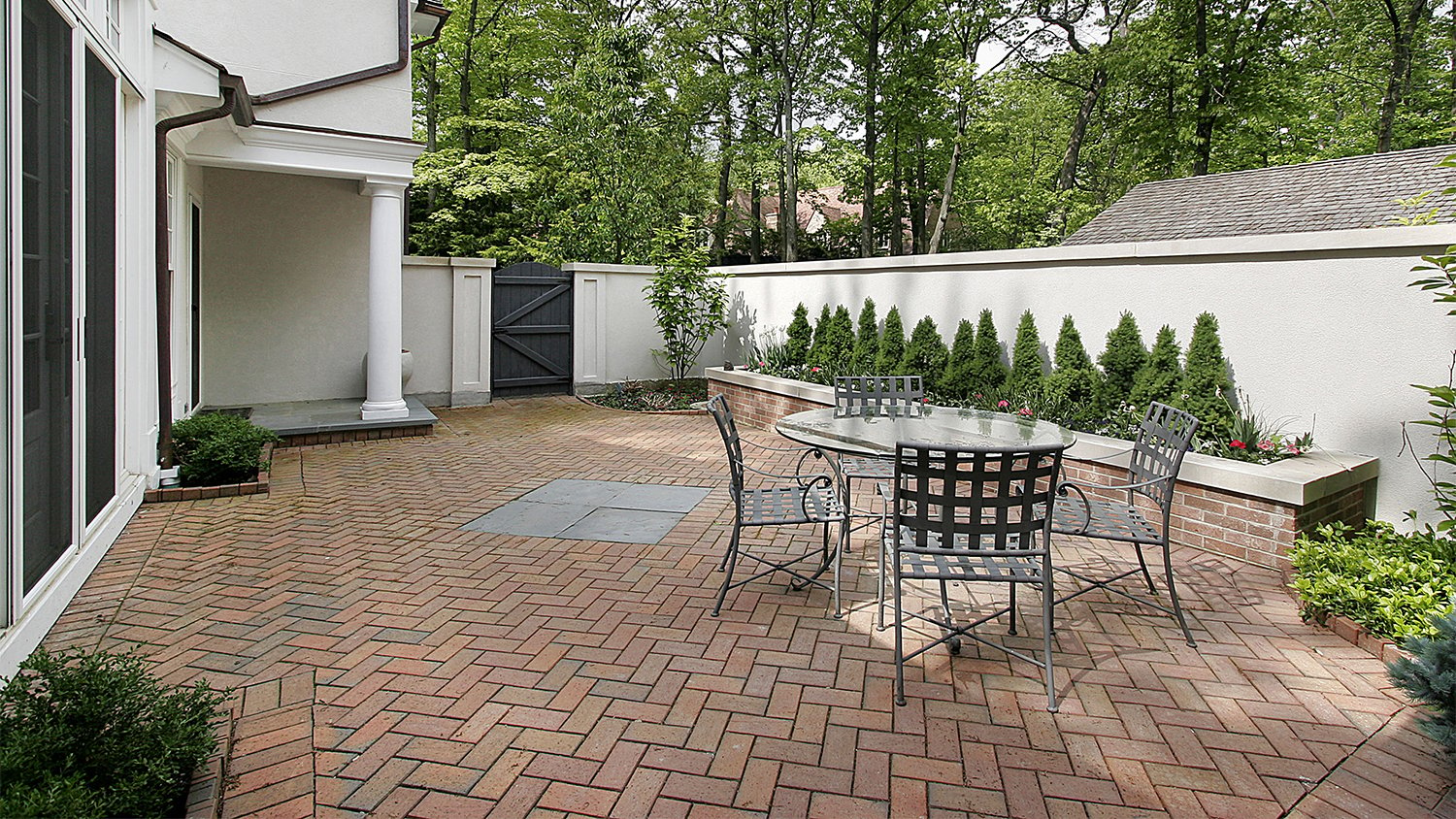
A concrete patio adds valuable outdoor living space to your home. Learn how much a concrete patio costs and which factors affect the project price.
Make the perfect entertainment space guilt-free


Whether you want to expand your outdoor entertainment space or remodel your backyard to accommodate a comfortable seating area, one thing’s for sure: Choosing a sustainable decking material can give you a stunning look you can feel good about.
Sustainable decks can be made from many different materials, including wood, recycled wood, aluminum, bamboo, and more. Here’s what you need to know when choosing sustainable material for your deck.
Sustainable materials for decks can be sourced from materials with a low carbon impact, responsibly managed forests, sustainable companies, or recycled materials.
Low-carbon materials include long-lasting materials that are easy to recycle and reuse and materials that don’t produce as many greenhouse gasses as other options.
For wood materials, in particular, the type of wood and how it’s sourced play huge roles in the sustainability of the product. Sustainable wood comes from local forests that aim to protect forests by using responsible forest management practices. This can include limited forest harvesting and conservation of natural resources.
Companies that partake in carbon offsetting programs also help reduce unnecessary waste or greenhouse gas emissions in the manufacturing or shipping process. They might also help conserve resources through recycling programs for old decking or yard waste materials.
From reclaimed wood and recycled plastic composite to upcycled aluminum, you can repurpose all kinds of materials to build a deck. When you choose to reuse, you’re helping to keep old materials out of landfills while reducing the production of new materials.

Wood might be one of the first materials that come to mind when you think of building a deck, but there are several deck materials out there that can add character and charm to the exterior of your home. Here’s a look at the most sustainable decking materials.
The standard building material for decks is wood, but whether you’re on the hunt for eco-friendly softwood decking or sustainable hardwood decking, you’ll want to keep the following factors in mind:
Hunt for locally grown wood species from sustainably harvested suppliers.
Look for untreated wood to avoid harsh chemical additives that could pose a threat to the environment, like chromated arsenicals, creosote, and pentachlorophenol, which the Environmental Protection Agency is currently reviewing for human safety.
If possible, choose recycled or reclaimed wood materials.
Look for the Forest Stewardship Council (FSC) label on the wood packaging to determine if the wood you’re looking at came from a responsibly managed forest.
Reclaimed wood gives you the opportunity to use materials that would otherwise be considered less sustainable. For example, you might want to make a sustainable choice for your deck but don’t want to compromise on using a rare wood species.
| Pros | Cons |
|---|---|
| Less expensive | Not the most durable |
| Multiple styles and colors | Needs ongoing maintenance |
| Plentiful | May scratch or stain |
Best for: Anyone who likes the look of natural wood and doesn’t mind putting in work to maintain it
Wood is the traditional decking choice, but not all types of wood are the best option for sustainability and long-term durability. Many kinds of natural timber are vulnerable to water damage, rot, and insects, and to stand up to the elements, they often need chemical treatments like copper-HDO, alkaline copper quaternary, or disodium octaborate tetrahydrate, none of which are exactly eco-friendly.
Composite decking is a good alternative to wood. Different types, including Trex and Ekodeck, offer boards made from a blend of recycled plastics and reclaimed wood fibers, creating a durable, low-maintenance alternative that's easier on the environment. Unlike untreated lumber, composite decking resists rot, warping, and pests without harsh chemicals.
| Pros | Cons |
|---|---|
| Highly durable | Less natural |
| Resists rot and insects | Pricier than wood |
| Low maintenance | Harder to recycle |
Best for: People who want a deck that resembles real wood but with less upkeep
Aluminum isn’t just for your soda on a hot day. Just as it’s a no-brainer for companies who want to ship that beverage in a cool, lightweight container, building a deck with aluminum is a lightweight, long-lasting, and infinitely reusable option.
Aluminum decks are waterproof, don’t require treatments like wood, and won’t rot, meaning you’ll have a long-lasting deck without the high maintenance that you’d get with a wooden deck.
| Pros | Cons |
|---|---|
| Minimal maintenance | Less attractive |
| Long-lasting | More expensive than wood |
| Resists mold and mildew | Fewer style options |
Best for: Folks in search of an ultra-low-maintenance and water-resistant decking material
High-density polyethylene resin (HDPE) decking is another material that can help cut down on plastic waste and deforestation. Make sure you choose a recycled plastic decking material that has 50% or more post-consumer waste in the formula to ensure you’re choosing a sustainable material.
The main downside to HDPE plastic decking is that the material is less sustainable than aluminum because it’s less durable and takes more energy to recycle and transport.
| Pros | Cons |
|---|---|
| Rot- and mold-resistant | Can fade in sunlight |
| Repels insects | May expand and contract |
| Uses recycled materials | Not the most durable |
Best for: People who prefer synthetic decking that won’t rot or attract insects
Though bamboo might seem like wood, it’s actually a giant type of grass. Like most grasses, bamboo has quite a reputation for growing fast, making it a top contender for deck materials. Not only does bamboo grow quickly, but it’s also lightweight, making it take less energy to transport. It’s also more water-resistant than traditional wood.
| Pros | Cons |
|---|---|
| Lightweight but strong | Requires resealing |
| Resists mold and rot | Less durable than others |
| Bamboo grows quickly | Not always harvested sustainably |
Best for: Anyone looking for a durable, natural, and aesthetically appealing decking material
Decking costs anywhere from $2 to $35 per square foot, with bamboo and cedar falling towards the lower end of the price range and composite and aluminum coming in at the higher end of the price range.
You might be able to save on costs by using recycled materials such as upcycled wood, bamboo, or aluminum, so head to your local hardware store and ask a local deck builder if they know where to find recycled building materials for your project.
If you’re hiring a professional for installation, one way you can make your sustainable deck project even more sustainable is by finding a contractor with vetted green credentials to install your new deck.
Companies that use sustainable materials, installation practices, and waste disposal methods might have one of the following certifications:
Leadership in Energy and Environmental Design (LEED)
Green Advantage’s Green Builder Certification
The National Association of Homebuilder’s Certified Green Professional credential
From average costs to expert advice, get all the answers you need to get your job done.

A concrete patio adds valuable outdoor living space to your home. Learn how much a concrete patio costs and which factors affect the project price.

Learn the cost of a metal awning for your home. Discover the essentials of installation, materials, and labor, and explore ways to save on your project.

Looking to spruce up your outdoor entertaining area? Learn how much it costs to seal pavers and what factors to consider when estimating your total.

Your new deck will be a welcomed outdoor living space. But what is deck flashing, and why do you need it? We discuss this important aspect of deck building.

Installing a concrete patio and want to customize? Check out the different types of concrete finishes for patios to choose what works best for your taste.

Using brick or concrete patio pavers can transform your backyard into your own luxury getaway. Browse our paver patio ideas to get your creative juices flowing.